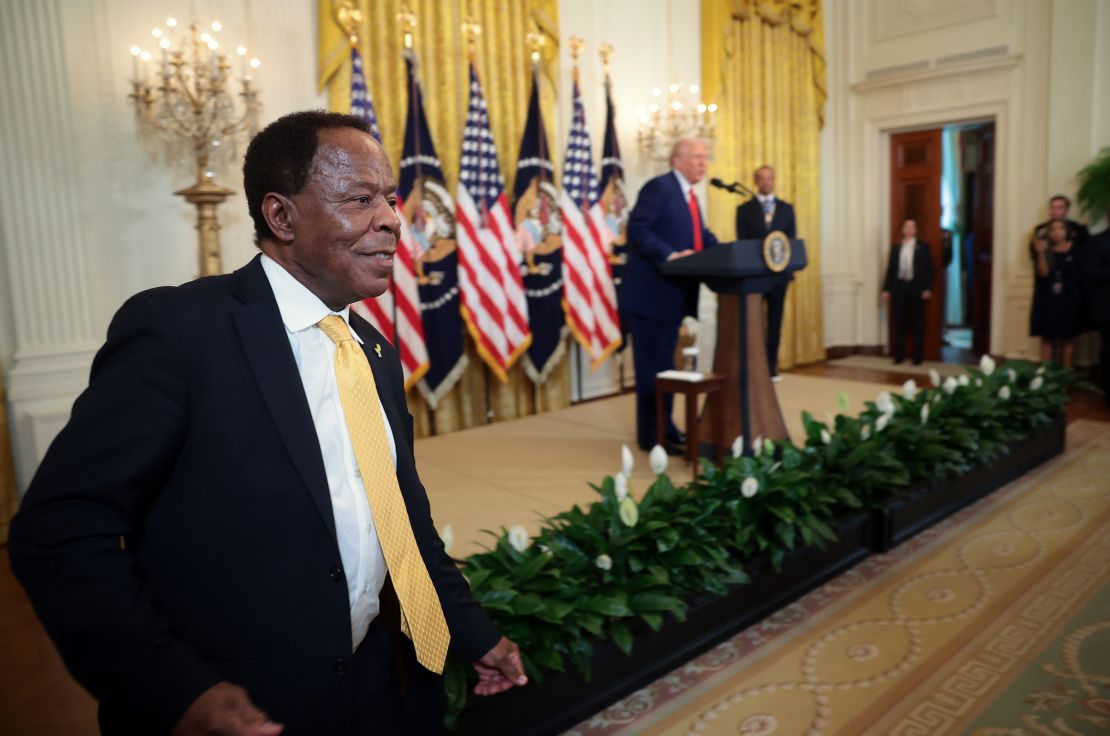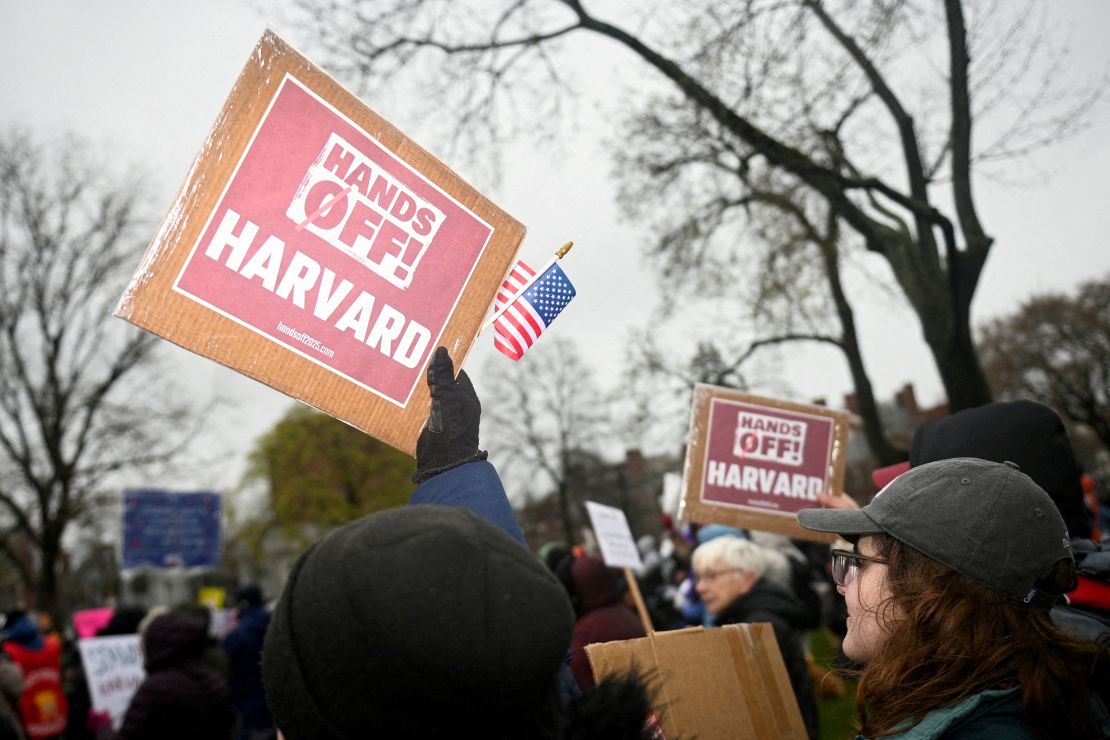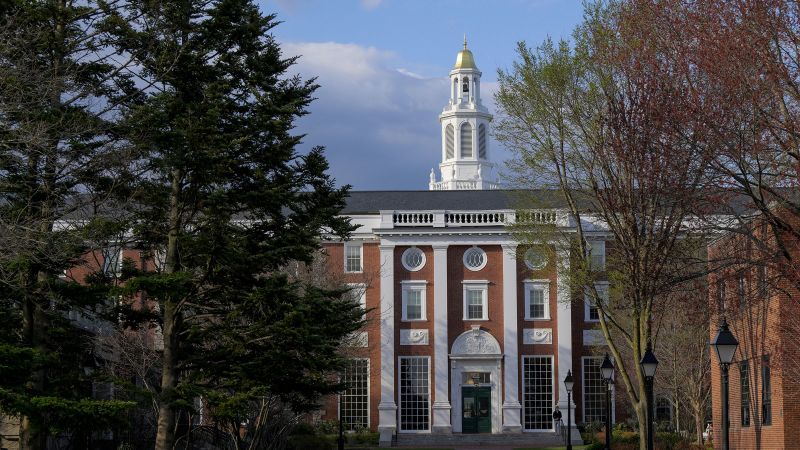CNN
—
The Trump administration’s aggressive aim at Harvard University and other higher education institutions is being quietly spearheaded by a Justice Department-led task force under the leadership of former Fox News personality and civil rights lawyer Leo Terrell, in conjunction with top Trump official Stephen Miller and others.
The administration says its Task Force to Combat Anti-Semitism, created following a February executive order, is intended to crack down on antisemitism on campuses amid the Israel-Hamas war. But even prominent Jewish organizations, including the Anti-Defamation League and Harvard’s chapter of the Hillel student organization, have publicly questioned the administration’s broad attacks on the university.
The task force’s early actions against the nation’s most elite academic institutions underscore the power and influence that Miller has amassed in Trump’s second term – implementing an agenda years in the making that extends far beyond the issue of combating antisemitism.
Months after its formation, the task force sent demands for policy changes to Harvard president Alan Garber, which the university rejected. Several days later, the federal task force announced a $2.2 billion funding freeze on Harvard, setting up a major clash over academic freedom, federal funding and campus oversight. The Ivy League university sued the Trump administration on Monday.
But the administration has recently signaled that it’s open to making a deal with Harvard, with one White House official comparing conversations around federal funding for higher educational institutions to Trump’s tariff policies – subject to negotiation.
Here’s what we know about the task force, its goals and its leaders:
Who’s in the task force – and who’s driving it
It is led by Terrell, senior counsel to the assistant attorney general for civil rights. Josh Gruenbaum, commissioner of the Federal Acquisition Service at the General Services Administration, and acting Health and Human Services general counsel Sean Keveney are among its members. Harmeet Dhillon, assistant attorney general for the civil rights division of the Department of Justice, is also involved.
The task force meets weekly and includes representatives from the Departments of Justice, Education, Health and Human Services, Homeland Security, Treasury, and the GSA, according to the White House official and a March Fox News interview with Terrell.
The White House declined to provide a full list of the names of its members. Terrell declined to comment to CNN.
But Miller, the White House deputy chief of staff, and other key White House officials involved in domestic policy are the driving force behind the president’s efforts, sources said, including senior policy strategist May Mailman and Domestic Policy Council director Vince Haley.
Miller is guiding this task force and other aligned efforts after four years away from the White House. “They came prepared — they took transition planning from the policy and operational perspectives very seriously,” a source familiar with the efforts said.

Terrell, a former civil rights attorney and Fox News commentator, was appointed to his post at the Justice Department by Trump in January.
A former Democrat, Terrell announced in 2020 that he would be voting for Trump, whom he says he considers a “friend.”
He has made his position and goals for the role clear: “We are suing every one of these universities guilty of antisemitism. We’re taking away their money,” he told Fox News’ Mark Levin during a March 8 appearance on “Life, Liberty & Levin.”
Terrell continued, “We’re gonna bankrupt these universities. We’re going to take away every single federal dollar. That is why we are targeting these universities.”
Terrell made his intentions known even before Trump won the election, warning in an October 2024 post to social media that Harvard “will lose much more effective January 2025. America will no longer fund Jew Hating Schools!”
The task force has a preliminary list of higher educational institutions to target. In addition to Harvard and Columbia, there are discussions underway between the task force and Northwestern University, Cornell University and the University of Michigan.
But this marks “just a first iteration” of the task force’s efforts, the White House official said, with the hope and expectation that other institutions will preemptively take steps to “end discrimination.”
“There’s no university that’s off limits, but there are some that are the most egregious, low-hanging fruit that make it easier for us to start directing action,” the official said.
A Justice Department press release also identified George Washington University; Johns Hopkins University; New York University; the University of California, Berkeley; the University of Minnesota; and the University of Southern California as “campuses that have experienced antisemitic incidents since October 2023.”
Garber told NBC’s Lester Holt in an interview on Wednesday that the Trump administration’s recent actions are an overreach, noting that antisemitism, while a “real problem,” has nothing to do with university research.
“I would say that at Harvard, we have a real problem with antisemitism. We take it very seriously, and we’re trying to address it,” Garber said. “We don’t really see the relationship to research funding at Harvard and other universities. They are two different issues.”
While the task force’s messaging has ostensibly centered around the administration’s efforts to crack down on antisemitism on campuses, the official acknowledged it’s also helped drive a larger political point.
“This is the president’s priority; this is not a showboating exercise,” the official said. But, they added, it has “(reawakened) the Republican Party and this administration to say hey, let’s look at how the taxpayers are funding these universities and say wait – we want to end antisemitism, but shouldn’t we also stop funding these universities that hate us that aren’t doing the work of the American people?”
There is a belief inside the White House that targeting the nation’s most elite institutions is a winning political strategy.
“Trump is putting Democrats in the space to defend the country’s most unpopular institutions – higher education, the media, the bureaucracy,” the source familiar with the efforts said.
Protests around the Israel-Hamas conflict on college campuses in the wake of Hamas’ October 7, 2023, attack “opened the door” to a larger debate, the White House official said.
And Terrell has suggested that his efforts won’t stop at higher education.
“The academic system in this country has been hijacked by the left, has been hijacked by the Marxists. They have controlled the mindset of our young people, and they haven’t stopped there,” he told Levin in March. “They’re going to the schools, the public schools – the K to 12. We have to put an end to it.”

As CNN has reported, administration officials reached out to Harvard representatives three times last week in an effort to restart talks, a person familiar with the outreach said. The nation’s oldest university indicated it was not interested in negotiating, the person said.
But it is the administration’s hope, the White House official said, that Harvard “comes to the table and corrects course.”
“This is an easy thing to resolve if the other side wants to play ball,” the official said, pointing to similar agreements between the Trump administration and some law firms it has targeted.
But Terrell offered a warning to those like Harvard who might not be willing to get in line, telling Fox News last month, “If these universities do not play ball, lawyer up – because the federal government is coming after you.”
Terrell also previewed actions the administration has ultimately initiated against Harvard, saying that the task force is “going to go after their 501c3 status.” Earlier this month, CNN reported that the Internal Revenue Service was making plans to rescind Harvard’s tax-exempt status.
When asked on Wednesday if Harvard can win the fight against the federal government, Garber told Holt, “I don’t know the answer to this question, but the stakes are so high that we have no choice.”
“What we do know,” he added, “is that we cannot compromise on basic principles like defense of our First Amendment rights.”
CNN’s Amanda Musa contributed to this report.

